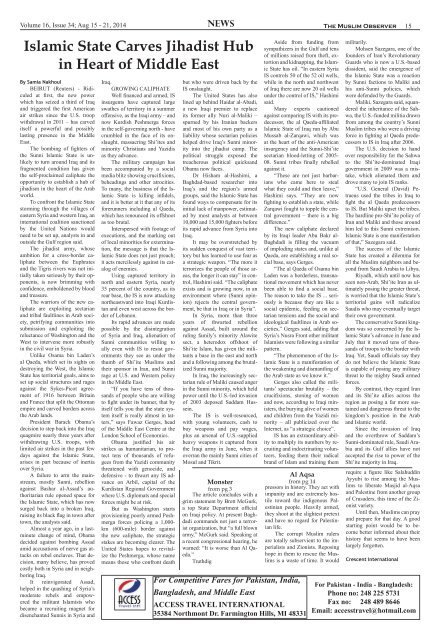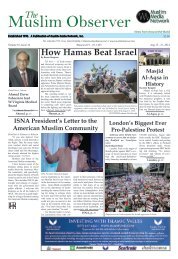Muslim Observer
You also want an ePaper? Increase the reach of your titles
YUMPU automatically turns print PDFs into web optimized ePapers that Google loves.
Volume 16, Issue 34; Aug 15 - 21, 2014<br />
news<br />
Islamic State Carves Jihadist Hub<br />
in Heart of Middle East<br />
By Samia Nakhoul<br />
BEIRUT (Reuters) - Ridiculed<br />
at first, the new power<br />
which has seized a third of Iraq<br />
and triggered the first American<br />
air strikes since the U.S. troop<br />
withdrawal in 2011 – has carved<br />
itself a powerful and possibly<br />
lasting presence in the Middle<br />
East.<br />
The bombing of fighters of<br />
the Sunni Islamic State is unlikely<br />
to turn around Iraq and its<br />
fragmented condition has given<br />
the self-proclaimed caliphate the<br />
opportunity to establish a hub of<br />
jihadism in the heart of the Arab<br />
world.<br />
To confront the Islamic State<br />
storming through the villages of<br />
eastern Syria and western Iraq, an<br />
international coalition sanctioned<br />
by the United Nations would<br />
need to be set up, analysts in and<br />
outside the Gulf region said.<br />
The jihadist army, whose<br />
ambition for a cross-border caliphate<br />
between the Euphrates<br />
and the Tigris rivers was not initially<br />
taken seriously by their opponents,<br />
is now brimming with<br />
confidence, emboldened by blood<br />
and treasure.<br />
The warriors of the new caliphate<br />
are exploiting sectarian<br />
and tribal faultlines in Arab society,<br />
petrifying communities into<br />
submission and exploiting the<br />
reluctance of Washington and the<br />
West to intervene more robustly<br />
in the civil war in Syria.<br />
Unlike Osama bin Laden’s<br />
al Qaeda, which set its sights on<br />
destroying the West, the Islamic<br />
State has territorial goals, aims to<br />
set up social structures and rages<br />
against the Sykes-Picot agreement<br />
of 1916 between Britain<br />
and France that split the Ottoman<br />
empire and carved borders across<br />
the Arab lands.<br />
President Barack Obama’s<br />
decision to step back into the Iraq<br />
quagmire nearly three years after<br />
withdrawing U.S. troops, with<br />
limited air strikes in the past few<br />
days against the Islamic State,<br />
arises in part because of inertia<br />
over Syria.<br />
A failure to arm the mainstream,<br />
mostly Sunni, rebellion<br />
against Bashar al-Assad’s authoritarian<br />
rule opened space for<br />
the Islamic State, which has now<br />
surged back into a broken Iraq,<br />
raising its black flag in town after<br />
town, the analysts said.<br />
Almost a year ago, in a lastminute<br />
change of mind, Obama<br />
decided against bombing Assad<br />
amid accusations of nerve gas attacks<br />
on rebel enclaves. That decision,<br />
many believe, has proved<br />
costly both in Syria and in neighboring<br />
Iraq.<br />
It reinvigorated Assad,<br />
helped in the quashing of Syria’s<br />
moderate rebels and empowered<br />
the militant Islamists who<br />
became a recruiting magnet for<br />
disenchanted Sunnis in Syria and<br />
Iraq.<br />
GROWING CALIPHATE<br />
Well financed and armed, IS<br />
insurgents have captured large<br />
swathes of territory in a summer<br />
offensive, as the Iraqi army – and<br />
now Kurdish Peshmerga forces<br />
in the self-governing north - have<br />
crumbled in the face of its onslaught,<br />
massacring Shi’ites and<br />
minority Christians and Yazidis<br />
as they advance.<br />
The military campaign has<br />
been accompanied by a social<br />
media blitz showing crucifixions,<br />
beheadings and other atrocities.<br />
To many, the business of the Islamic<br />
State is killing infidels,<br />
and it is better at it that any of its<br />
forerunners including al Qaeda,<br />
which has renounced its offshoot<br />
as too brutal.<br />
Interspersed with footage of<br />
executions, and the marking out<br />
of local minorities for extermination,<br />
the message is that the Islamic<br />
State does not just preach;<br />
it acts mercilessly against its catalog<br />
of enemies.<br />
Using captured territory in<br />
north and eastern Syria, nearly<br />
35 percent of the country, as its<br />
rear base, the IS is now attacking<br />
northeastward into Iraqi Kurdistan<br />
and even west across the border<br />
of Lebanon.<br />
Its rapid advances are made<br />
possible by the disintegration<br />
of Syria and Iraq, alienation of<br />
Sunni communities willing to<br />
ally even with IS to resist governments<br />
they see as under the<br />
thumb of Shi’ite <strong>Muslim</strong>s and<br />
their sponsor in Iran, and Sunni<br />
rage at U.S. and Western policy<br />
in the Middle East.<br />
“If you have tens of thousands<br />
of people who are willing<br />
to fight under its banner, that by<br />
itself tells you that the state system<br />
itself is really almost in tatters,”<br />
says Fawaz Gerges, head<br />
of the Middle East Centre at the<br />
London School of Economics.<br />
Obama justified his air<br />
strikes as humanitarian, to protect<br />
tens of thousands of refugees<br />
from the Yazidi community<br />
threatened with genocide, and<br />
defensive - to thwart any IS advance<br />
on Arbil, capital of the<br />
Kurdistan Regional Government<br />
where U.S. diplomats and special<br />
forces might be at risk.<br />
But as Washington starts<br />
provisioning poorly armed Peshmerga<br />
forces policing a 1,000-<br />
km (600-mile) border against<br />
the new caliphate, the strategic<br />
stakes are becoming clearer. The<br />
United States hopes to revitalize<br />
the Peshmerga, whose name<br />
means those who confront death<br />
but who were driven back by the<br />
IS onslaught.<br />
The United States has also<br />
lined up behind Haidar al-Abadi,<br />
a new Iraqi premier to replace<br />
its former ally Nuri al-Maliki –<br />
spurned by his Iranian backers<br />
and most of his own party as a<br />
liability whose sectarian policies<br />
helped drive Iraq’s Sunni minority<br />
into the jihadist camp. The<br />
political struggle exposed the<br />
treacherous political quicksand<br />
Obama now faces.<br />
Dr Hisham al-Hashimi, a<br />
Baghdad-based researcher into<br />
Iraq’s and the region’s armed<br />
groups, said the Islamic State has<br />
found ways to compensate for its<br />
initial lack of manpower, estimated<br />
by most analysts at between<br />
10,000 and 15,000 fighters before<br />
its rapid advance from Syria into<br />
Iraq.<br />
It may be overstretched by<br />
its sudden conquest of vast territory<br />
but has learned to use fear as<br />
a strategic weapon. “The more it<br />
terrorizes the people of those areas,<br />
the longer it can stay” in control,<br />
Hashimi said. “The caliphate<br />
exists and is growing now, in an<br />
environment where (Sunni opinion)<br />
rejects the central government,<br />
be that in Iraq or in Syria”.<br />
In Syria, more than three<br />
years of thwarted rebellion<br />
against Assad, built around the<br />
ruling family’s minority Alawite<br />
sect, a heterodox offshoot of<br />
Shi’ite Islam, has given the militants<br />
a base in the east and north<br />
and a following among the brutalized<br />
Sunni majority.<br />
In Iraq, the increasingly sectarian<br />
rule of Maliki caused anger<br />
in the Sunni minority, which held<br />
power until the U.S.-led invasion<br />
of 2003 deposed Saddam Hussein.<br />
The IS is well-resourced,<br />
with young volunteers, cash to<br />
buy weapons and pay wages,<br />
plus an arsenal of U.S.-supplied<br />
heavy weapons it captured from<br />
the Iraqi army in June, when it<br />
overran the mainly Sunni cities of<br />
Mosul and Tikrit.<br />
Monster<br />
from pg 3<br />
The article concludes with a<br />
grim statement by Brett McGurk,<br />
a top State Department official<br />
on Iraqi policy. At present Baghdadi<br />
commands not just a terrorist<br />
organization, but “a full blown<br />
army,” McGurk said. Speaking at<br />
a recent congressional hearing, he<br />
warned: “It is worse than Al Qaeda.”<br />
Truthdig<br />
Aside from funding from<br />
sympathizers in the Gulf and tens<br />
of millions raised from theft, extortion<br />
and kidnapping, the Islamic<br />
State has oil. “In eastern Syria<br />
IS controls 50 of the 52 oil wells,<br />
while in the north and northwest<br />
of Iraq there are now 20 oil wells<br />
under the control of IS,” Hashimi<br />
said.<br />
Many experts cautioned<br />
against comparing IS with its predecessor,<br />
the al Qaeda-affiliated<br />
Islamic State of Iraq run by Abu<br />
Mussab al-Zarqawi, which was<br />
at the heart of the anti-American<br />
insurgency and the Sunni-Shi’ite<br />
sectarian blood-letting of 2005-<br />
08. Sunni tribes finally rebelled<br />
against it.<br />
“These are not just barbarians<br />
who came here to steal<br />
what they could and then leave,”<br />
Hashimi says. “They are now<br />
fighting to establish a state, while<br />
Zarqawi fought to topple the central<br />
government – there is a big<br />
difference.”<br />
The new caliphate declared<br />
by its Iraqi leader Abu Bakr al-<br />
Baghdadi is filling the vacuum<br />
of imploding states and, unlike al<br />
Qaeda, are establishing a real social<br />
base, says Gerges.<br />
“The al Qaeda of Osama bin<br />
Laden was a borderless, transnational<br />
movement which has never<br />
been able to find a social base.<br />
The reason to take the IS ... seriously<br />
is because they are like a<br />
social epidemic, feeding on sectarian<br />
tensions and the social and<br />
ideological faultlines in Arab societies,”<br />
Gerges said, adding that<br />
Syria’s Nusra Front other militant<br />
Islamists were following a similar<br />
pattern.<br />
“The phenomenon of the Islamic<br />
State is a manifestation of<br />
the weakening and dismantling of<br />
the Arab state as we know it.”<br />
Gerges also called the militants’<br />
spectacular brutality – the<br />
crucifixions, stoning of women<br />
and now, according to Iraqi ministers,<br />
the burying alive of women<br />
and children from the Yazidi minority<br />
– all publicized over the<br />
Internet, as “a strategic choice”.<br />
IS has an extraordinary ability<br />
to multiply its numbers by recruiting<br />
and indoctrinating volunteers,<br />
feeding them their radical<br />
brand of Islam and training them<br />
Al Aqsa<br />
from pg 14<br />
pressors in history. They act with<br />
impunity and are extremely hostile<br />
toward the indigenous Palestinian<br />
people. Heavily armed,<br />
they shoot at the slightest pretext<br />
and have no regard for Palestinian<br />
life.<br />
The corrupt <strong>Muslim</strong> rulers<br />
are totally subservient to the imperialists<br />
and Zionists. Reposing<br />
hope in them to rescue the <strong>Muslim</strong>s<br />
is a waste of time. It would<br />
For Competitive Fares for Pakistan, India,<br />
Bangladesh, and Middle East<br />
ACCESS TRAVEL INTERNATIONAL<br />
35384 Northmont Dr. Farmington Hills, MI 48331<br />
The <strong>Muslim</strong> <strong>Observer</strong><br />
15<br />
militarily.<br />
Mohsen Sazegara, one of the<br />
founders of Iran’s Revolutionary<br />
Guards who is now a U.S.-based<br />
dissident, said the emergence of<br />
the Islamic State was a reaction<br />
by Sunni factions to Maliki and<br />
his anti-Sunni policies, which<br />
were defended by the Guards.<br />
Maliki, Sazegara said, squandered<br />
the inheritance of the Sahwa,<br />
the U.S.-funded militia drawn<br />
from among the country’s Sunni<br />
<strong>Muslim</strong> tribes who were a driving<br />
force in fighting al Qaeda predecessors<br />
to IS in Iraq after 2006.<br />
The U.S. decision to hand<br />
over responsibility for the Sahwa<br />
to the Shi’ite-dominated Iraqi<br />
government in 2009 was a mistake,<br />
which alienated them and<br />
drove many to join IS ranks.<br />
“U.S. General (David) Petraeus<br />
used the tribes in Iraq to<br />
fight the al Qaeda predecessors<br />
to IS. But Maliki upset the tribes.<br />
The hardline pro-Shi’ite policy of<br />
Iran and Maliki and those around<br />
him led to this Sunni extremism.<br />
Islamic State is one manifestation<br />
of that,” Sazegara said.<br />
The success of the Islamic<br />
State has created a dilemma for<br />
all the <strong>Muslim</strong> neighbors and beyond<br />
from Saudi Arabia to Libya.<br />
Riyadh, which until now has<br />
seen non-Arab, Shi’ite Iran as ultimately<br />
posing the greater threat,<br />
is worried that the Islamic State’s<br />
territorial gains will radicalize<br />
Saudis who may eventually target<br />
their own government.<br />
The conservative Sunni kingdom<br />
was so concerned by the Islamic<br />
State’s advance in June and<br />
July that it moved tens of thousands<br />
of troops to the border with<br />
Iraq. Yet, Saudi officials say they<br />
do not believe the Islamic State<br />
is capable of posing any military<br />
threat to the mighty Saudi armed<br />
forces.<br />
By contrast, they regard Iran<br />
and its Shi’ite allies across the<br />
region as posing a far more sustained<br />
and dangerous threat to the<br />
kingdom’s position in the Arab<br />
and Islamic world.<br />
Since the invasion of Iraq<br />
and the overthrow of Saddam’s<br />
Sunni-dominated rule, Saudi Arabia<br />
and its Gulf allies have not<br />
accepted the rise to power of the<br />
Shi’ite majority in Iraq.<br />
require a figure like Salahuddin<br />
Ayyubi to rise among the <strong>Muslim</strong>s<br />
to liberate Masjid al-Aqsa<br />
and Palestine from another group<br />
of Crusaders, this time of the Zionist<br />
variety.<br />
Until then, <strong>Muslim</strong>s can pray<br />
and prepare for that day. A good<br />
starting point would be to become<br />
better informed about their<br />
history that seems to have been<br />
largely forgotten.<br />
Crescent International<br />
For Pakistan - India - Bangladesh:<br />
Phone no: 248 225 5731<br />
Fax no: 248 489 8646<br />
Email: accesstravel@hotmail.com





